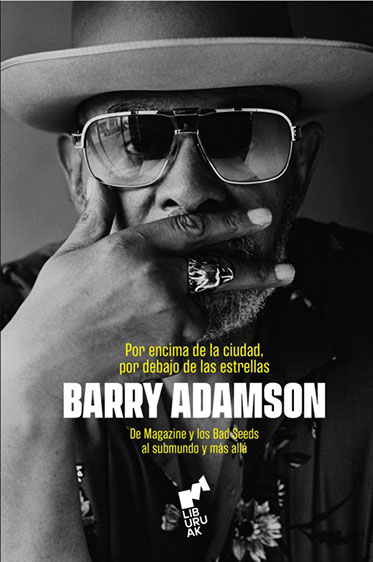Barry Adamson – Above the city, below the stars. From Magazine and the Bad Seeds to the underworld and beyond
It is inevitable for me to remember Kid Congo Powers when facing the memories of Barry Adamson: both were for a long time secondary names at the service of big projects (the one in The Cramps and The Gun Club, this one in Magazine or with Iggy Pop; both in Nick Cave’s Bad Seeds), talents grown in the self-didacticism of the do it yourself from punk, marked by their race (one Chicano, the other mestizo) in very white environments, in which they could feel out of place, and by their addictions to drugs and alcohol, and both are – also – good friends. As if that were not enough, his autobiographies have practically coincided in time – Adamson’s originally arrived a year earlier – and have been published here in Spanish by the same publisher. Only the translator changes (here it is the proven Ibon Errazkin) and also some of the style, because if Barry Adamson’s career took on an unexpected height of flight from his first solo album, in 1989, so did his way of telling things. It has a more distinguished literary tone. And that’s it for the comparisons, which are almost always odious.
This book is another story of initiation into life, a story coming of age in full swing, which stops at the beginning of the nineties, and along the way shows us a vision as cinematic and imaginative as its author’s own albums in recent decades (the next one will be out in a few weeks, by the way). Barry Adamson He sees himself from the outside and lucidly, as if his life were a movie. He projects his experience to the outside, unfolding like a Deus ex machina. And the truth is that he never had it easy. His humble origins, the dyschondroplasia that affected him as a child, his sister’s illness or the sexual abuse suffered at the hands of an acquaintance are relieved by musical epiphanies: “Fever” by Peggy Lee, the soundtrack of “Goldfinger” (1964) in a cinema on the coastal Morecambe, the Beach Boys’ “Good Vibrations”, Alice Cooper’s records as a teenager and everything that pushed him to become the new seducer Barry (to use Jarvis Cocker’s terminology and his Pulp) in the footsteps of the old man, the great John Barry. Without the intention of giving a spoiler, in the end the outcome is easy to imagine: the bird of bad omen (a vulture, in his case) dissipates after fatherhood, a failed marriage and rehabilitation, but the transit reveals a narrative material that, beyond the experience itself, is remarkable.
